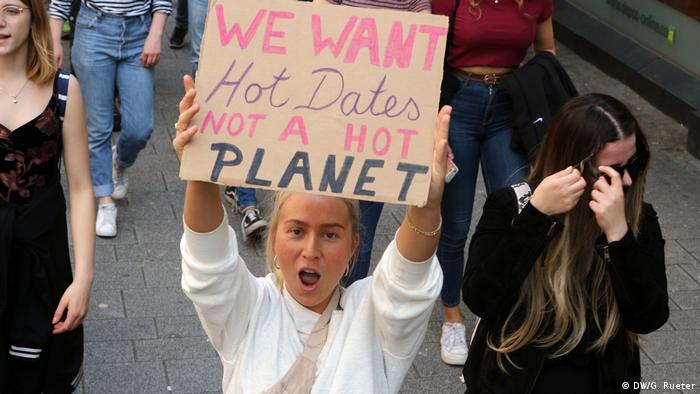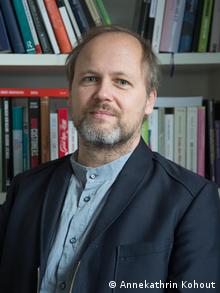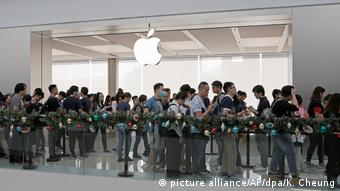The end of the disposable culture, believes the consumer theorist Wolfgang Ullrich. What needs to happen for them yet, he explains Interview in the DW.

For months, mainly young people protesting worldwide against the climate policies of their governments. The Green experience in Germany, undreamt-of heights and want to prohibit mail-order companies such as Amazon, the destruction of returns. Environment Minister Svenja Schulze (SPD) is taking on this initiative and announced that a corresponding draft law. The disposable society is really undergoing a change?
DW: Mr. Ullrich, and when you have returned your last parcel?
Wolfgang Ullrich: to be Honest, I’ve personally never had a package returned. I order very little online, and if something doesn’t fit one hundred percent, not to return it, but honestly not for ecological reasons, but rather out of convenience.
At the moment it seems, as society’s environmental awareness would increase. We are discussing climate issues, the Greens are experiencing a boom, the youth protested in Fridays for the Future. This will affect you long term?
Yes, because in significant Parts of the population, the environmental awareness is increasing, if only very partially. Until air travel came into focus, and now the return of the packages of kidneys and plastic bags. Much of what has on the ecological balance of similar impact, are not yet in the foreground, the food or the Heat. It is interesting that the debate is very hung heavily in the topic of consumption, to the small, everyday consumption habits, which you discovered as a screws, which you can perhaps do something about it.

Sees social responsibility as the currency: consumer theorist Wolfgang Ullrich
We can help with consumer decisions, but also our Conscience, we buy in supposedly healthy stuff, or Fair-Trade products.
Because you have to be very careful, because it is, of course, suggests that you be especially eco-conscious, if you can do without a plastic bag, or even to eat less meat. As you land quickly when the term “Rebound effect”: If you as a Consumer of a good Conscience, it is thought, to be able to once again kick over the traces and, thus, acuminate: I have interned for a month, no package returned, now I must fly again to Mallorca. It forms too much on what you save, and behaves even more wasteful.
Conscious behavior is sometimes in tension: What is ecologically sustainable, does not need to necessarily be social.
It is always complex. I have, of course, good arguments to buy Fair Trade chocolate: I make sure that no one is going to heavily exploited, and I’m doing maybe a little for the infrastructure in an economically weak country. On the other hand, I favour again the absurd transport routes, ecologically, so it is rather nonsensical. Personally, I have to decide again and again whether I have an ecological interest, a social or structural. We as consumers are frustrated, because we feel this is their own insecurity.
In the case of the enlightenment, therefore, the industry would have to help?
As has happened in the last ten years, something. My criticism, when the manufacturer suggest, through the purchase of a product, everything was good again. I would like to see more honesty, perhaps even that company are a step more radical, with the good Conscience back a bit – and the bad Conscience a bit high to drive.
How do you take a company the fear of loss of revenue?

Carefree shopping: A portion of the returns will be destroyed by the providers. That’s about to change.
Of course, this is a risk, a company can on the other hand, to benefit from a better Image and compared to competitors, in the advantage be, if it works with more honesty.
Eco-conscious decisions have to do with a waiver by the consumer. We want to fly into the holidays, instead of driving each year with a train to the Baltic sea, which corresponds to the self-understanding of the welfare societies. The necessary waiver with our individual claims does not compete?
The question is, how the waiver is encoded and how he maybe even the character of a reward can get. Strong brands that already have the status of a cult, could bring about great changes. Not imagine, the next iPhone, which comes on the market, there are just only for money, but the only someone who can prove that he is not flown for the last two years, or 20 hours of environmental work in his community has done a gets. The status icon would be much more valuable than if it is everyone can have 800 euros to spare.
This is exciting, but it sounds like a utopian, especially in the case of a company like Apple, that will be denounced due to its working conditions for its products to raw materials relies, according to which children in Africa are mining. Although everyone knows a new iPhone is still cooler than the rejection of it.
Yes, although the issue of working conditions in the future, greater emphasis and attention will be. Therefore, companies from the fear of Image and loss of status is something superior to and social responsibility more to the outside to demonstrate. Thus, I can imagine that new business models could be established with a second currency in addition to money relatively quickly.
We want to do without socially ready?
In all religions we have, actually, always also forms of waiver, the people have accepted or even well found. So the question is: Who today has had in our society this Status, the religions for a long time? Brands today are something of a substitute Religion, so maybe you have the power, forms of renunciation in society to enforce or to make it attractive.

Soon an image of the past? Queues in front of the start of sales of the new iPhones
You describe consumption with the concepts of living and identification. Just the identification of linked brands and status symbols: I can’t afford the newest iPhone and feel culturally versed, because I can travel around the world. In the theory of the consumer as a substitute satisfaction that fills a content Void, let the consumer make it difficult for a waiver to convince.
That’s true. To the outside I give signals by means of status symbols, directed inwards, I can meet certain consumer my life with a sense, it is structuring. But what is perceived as valuable and meaningful, is everything set to other than. So was fresh and clean earlier than new money, the long use of objects had a higher Status. In order for a Person showed that they had continuity in their lives, traditions, and, in the best sense a conservative was. Maybe Patina will be in the future worth more than the Flawless – but this time, because it signals that someone is environmentally aware, and his things all the time by newer replaced.
The industry has long recognized that an expiration date promotes the consumption of a television is no longer hold today, 20 years, in the case of the mobile phones, the battery can independently switch the new Apps you can download also, if the device is too old.
Yeah, that has developed in the last decades, clearly. But I think that the critical Public will not have to join in the long term and, at least in individual sectors, shift in thinking. Of course, you need to consider other business models to come on the same profits. But if you take the Eco – and climate issues seriously, you will not fail.
The individual consumption behavior is a question of voluntariness. We need more concrete requirements or prohibitions? If the package shipping and the Return cost of something, we order, perhaps, so easily.
Probably you are right where you need to be very careful must, it is not so to control that those with more money have, without major losses, so continue as before. People with less money have to do without many things, and then perhaps even more restrictions. But, of course, legal rules can be helpful.
In the case of “Fridays for Future” one can get the impression that other issues are actually more important than possessions and Status, the protesters argue, the very reflected. Can give these youth hope?
Yes, I’m optimistic. When these young people start up in a few years, Start-ups, can you define what is important to you and how you want to work. Your goals can have an influence that we today simply cannot imagine.
Wolfgang Ullrich, Professor for art science and media theory at the Hochschule für Gestaltung in Karlsruhe. Since 2015 he works as a freelance author, a. o. appeared in consumption “only. Critique of commodity aesthetic education”.
The interview was conducted by Torsten Landsberg.